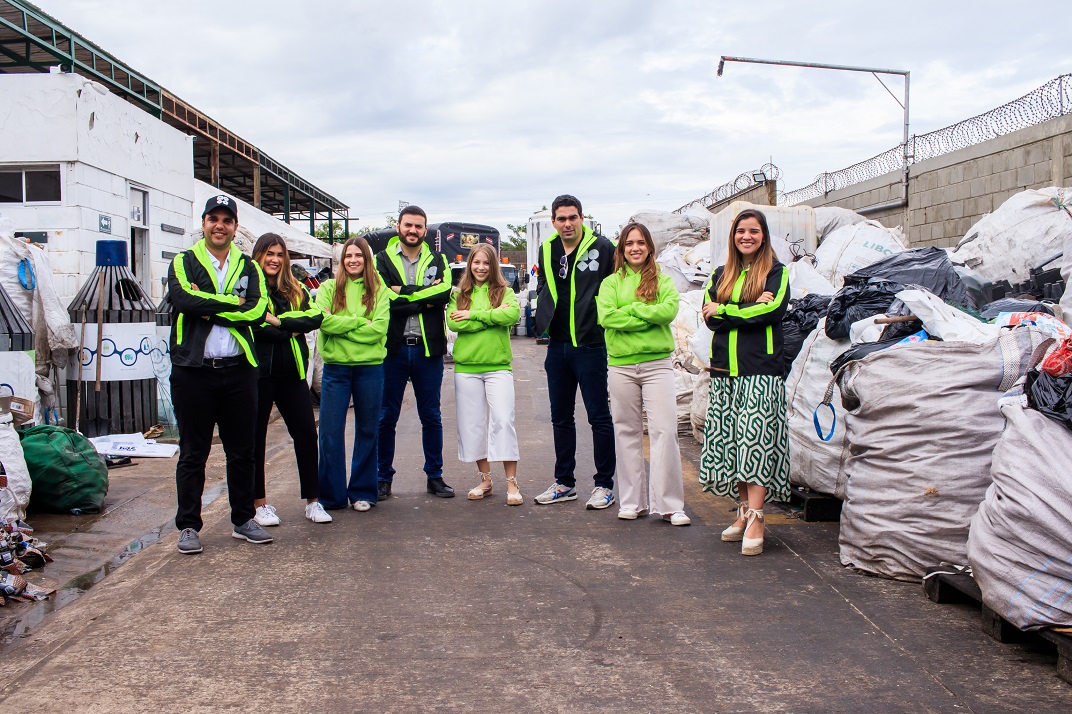Transforming waste collectors lives with circular economy innovation
Earning a living from informal street recycling is tough, insecure work. Recyclers spend their days searching for materials, walking for hours with no guarantee of a decent income at the end of it.
But in Colombia, MUTA is transforming working conditions for recyclers, by formalizing their employment and providing a regular wage alongside benefits such as healthcare and holiday pay. The company has big plans to expand across Latin America where around four million people make a living through informal recycling.
At the heart of MUTA’s business model is its Smart Recycling platform, explains founder and chief executive Alejandro Caiaffa (furthest left on the above image), which was built by the company’s in-house tech team and had 2,000 active users by December 2022. “It is an end-to-end platform that connects the generators of recyclable materials with the collectors who are then connected to the processors. It traces and tracks all the materials, giving waste generators the ability to request their collection and earn an income from every single kilogram, which is a real incentive to recycle.”
Collectors are assigned a route through the platform, enabling them to use their time efficiently and providing certainty about how much material they will collect. “They now have safe conditions to work in and they collect in a truck so they’re not walking 15km a day in rain or sun. They’re also on the payroll, able to take vacations and have access to healthcare,” adds Alejandro. Once collected the waste is delivered to MUTA warehouses, to be processed and sold.
Incomes for MUTA’s recyclers can rise to USD 460 per month for route leaders, compared to around USD 180 for informal recyclers. Equally as important is the formality MUTA brings to this workforce says Alejandro. “We make them part of the labour ecosystem so they can show potential employers they have experience of working for a company, managing their time on a smartphone and paying into healthcare, which opens opportunities.”
The transparency MUTA’s platform provides also enables the company to break into international markets, where buyers require products to meet quality assurance and sustainability certification standards. “The ability to demonstrate you have the correct structures and processes in place is also key to attracting investment from investors such as the CFC,” says Alejandro.
The main buyer for MUTA’s primary export, used cooking oil (UCO), is a UK biofuel trader. It’s a sector that has exciting growth potential with the UCO market expected to grow from USD 5.97 billion in 2021 to USD 10.08 billion in 2028. Instead of discarding used cooking oil down the drain or in the trash, recycling it can help reduce pollution, conserve resources, and create valuable products.
In Colombia, between 20-30% of UCO is recycled which means there is scope to increase the amount that is reused and MUTA aims to collect 10,000 MT by 2025 while formalising employment for 350 street collectors.
Alongside the positive impact this will have on livelihoods, it will reduce the amount of oil that is disposed of in an ecologically damaging way.
After launching in the coastal city of Barranquilla in 2014, MUTA has now expanded into 60 cities and municipalities in Colombia and has plans to launch in Mexico and Brazil. “We want to become the biggest circular economy platform in Latin America across all waste materials,” says Alejandro. The CFC is supporting this ambition by investing USD 450,000, which will enable it to employ more collectors and increase the volume of its exports.
CFC Impact Investment Manager Ernesto Daza Lacouture says: “MUTA combines tech innovation and a solid business model to generate positive environmental and social impact which is why we were so keen to support the company. It’s also our first investment in a circular economy business, so it is an exciting step for us. The company is already making a huge difference to the lives of street recyclers and has potential to expand its impact across Latin America, by making more of them a formal part of the circular economy.”
But MUTA may not have existed if it hadn’t been for a football injury.
Alejandro played professionally for Livingston in Scotland, before moving on to FC Baulmes in Switzerland. When a knee problem put an early end to his career he went to university in Barranquilla. During a holiday to Miami, he noticed cooking oils being collected which sparked his entrepreneurial curiosity – after his studies he used savings to buy a small truck and start doing the same in his city. This gave him an insight into the lives of waste collectors and the motivation to change them.
The link between football and recycling may seem tenuous but his experience on the pitch has shaped him as a business leader. “To succeed in football you have to consistently perform to a high level and be prepared to train, train and train to constantly improve. You also have to work in a team and learn how to handle different personalities, cultures and mindsets.”
Alejandro has transferred these attributes to MUTA. The desire to continually enhance how the company operates has driven its growth from a one-man operation paying cash to suppliers, to a business that, he says, is “trying to transform the recycling industry and the lives of those who work in it through technology, innovation and formalization.”
It’s an ambitious goal, but the MUTA team looks equipped to achieve it.

